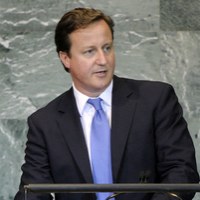![]()
ADDRESS
BY
His Highness
Sheikh Tamim bin Hamad Al-Thani
BEFORE
The sixty-eighth session of
the United Nations General Assembly
UN Headquarters — New York
24 SEPTEMBER 2013
In the name of Allah, the beneficent, the merciful
Your Majesties, Excellences and Highnesses,
Your Excellency the President of the United Nations General Assembly
Your Excellency the UN Secretary General
Ladies and gentlemen,
I would like, first, to congratulate His Excellency Mr. John Ashe for his election as President of the 68th session of the General Assembly and I wish him all success in his mission.
I would like also to express our appreciation for His Excellency Mr. Vuk Jeremic, the former President of the 67th session for the efforts he made for its success.
I would like also to commend all the efforts made by His Excellency the Secretary General Mr. Ban Ki-moon for strengthening the role of the United Nations.
Mr. President,
The international community faces different problems related to peace and security in addition to the challenges facing the efforts made to solve disputes peacefully. This calls for reinforcing the capacity of the United Nations to tackle these challenges and problems.
The peoples of different regions are looking forward for the institutions of the international community to dedicate their efforts for finding solutions to the issues of poverty, hunger, and sustainable development in a way the goes beyond convening conferences and adopting resolution and even beyond the necessary collective attention and campaigns that are called for from time to time important as they might be.
Mr. President,
The Arab region is full of events and accelerating changes of historical importance. It has recently witnessed turbulent events as a result of the movement of its peoples and their forceful entery into the public political domain.
Stalemate remains characteristic of the Arab-Israeli conflict, which comes at the forefront of the issues threatening international peace and security. This is a result of the continued Israeli occupation and the injustice inflicted upon the Palestinian people as well as the failure in reaching a just and lasting peace according to the resolutions of the international legality.
Continued Israeli occupation of Palestinian and Arab territories with its resulting practices, changing their demographic conditions particularly by extending the scope of settlement activity, Judaizing the city of Jerusalem, the unjust embargo of Gaza strip in addition to the intensification of settlement in the occupied Syrian Golan Heights and changing its status quo, cannot be accepted as normal. That is not because they represent flagrant violations of the international laws and covenants, but also because the Palestinian issue is a just issue and the historical inflicted upon the Palestinian people should end.
The organizations of the international community have been established on the basis of granting the right of self-determination after the world wars. And it is unreasonable that they could not do anything about the last colonial issue of our world.
Israel should know that coercion and de facto policies do not bring peace. It is wrong for it to establish a state which sees peace in subjugating the other peoples and denying their rights and make that a priority over peace. In fact, there is no security without peace. Real peace comes only through coexistence between peoples on the grounds of good neighborliness, mutual respect, and caring for the interests of all.
The peace we look for is the peace that is built on dignity, justice and the principles of international legality as well as the UN resolutions and the Arab Peace Initiative under the principle of the two-state solution and the withdrawal of Israel from all occupied Arab territories. In fact, the experiences of different nations and peoples confirm that unjust settlements did not endure but were just pretexts for new conflicts. The continued de facto policy in Palestine would not make the issue disappear. It actually transforms before our eyes into a more complicated issue for the continuation of the settlements leads to the destruction of the basis for establishing a Palestinian state while the current status changes to one that resembles an apartheid under the domination of one state or even within the state. This would be a grounds for new conflict since no people will accept enduring injustice and keep silent.
The inalienable national rights of the Palestinian people in establishing its independent state with Jerusalem as its capital within the limits of 1967 borders as well as the right of return for the Palestinian refugees are not only an Arab demand, but they also represent an international standard for testing the credibility of international legality, which should not be divisible. Just as the international community has applied the principles of international legality in the past for other crises in the world, we should apply the same legal principles for all issues. Therefore, we call upon the Security Council to uphold its responsibility to maintain international peace and security and adopt the required decisions to stop the illegitimate Israeli practices.
Mr. President,
Destructive actions and horrible massacres are continuing at the hands of the Syrian regime against its peoples in addition to the policies of scorched land upon the Syrian people crossing all the red lines set by ethics and mandated by law, particularly after the regime’s use of chemical weapons against the Syrian people.
It is unfortunate that the perpetrators of these brutal crimes and massacres, which have shocked every human conscience, are enjoying impunity from deterrence or accountability. This questions the credibility of the human rights and international legality mechanisms of the international community.
The issue is not whether or not Syria possesses to chemical weapons for Syria is a state that is in conflict with another state that owns chemical, biological and even nuclear weapons. But the issue is the use of such weapons by the regime against its own people.
The Syrian people has not risen up for putting the Syrian chemical weapons under the international supervision but for getting rid of despotism and corruption and to end the injustice it has been facing.
We all know that the responsibility for failure to impose the political settlement we all prefer for Syria is due basically to the inability of the Security Council to take the required decision to stop the bloodshed and the continued intransigence of the Syrian regime and its refusal of all regional and international initiatives.
From this perspective, the decision-making process at the Security Council has become in need of change since it lacks fairness and objectivity. It has also become a major obstacle to preserving international peace and security and to the punishment of war criminals and perpetrators of crimes against humanity. Therefore, we affIrm the importance of accelerating the process of Security Council reform in order for it to be more capable for dealing objectively with global challenges and responding to the aspirations of people. But this will not be achieved except through the fair representation of the international community in the Council and only when it becomes expressive of the democracy in the international multilateral work. It is obviously impossible to take any decision without the support of the majority of the permanent member States, but taking a decision should not be monopolized for a long period by one or two states.
I take this opportunity to call upon our Syrian brothers to unify their ranks for entering a transitional period that leads to establishing a governing system that guarantees freedom and dignity for all Syrians without discrimination on the grounds of gender, nationality, sect or creed. These large numbers of martyrs have not fallen and all these sacrifIces have not been made by this great people so that despotism could be exchanged for chaos or another kind of despotism.
Mr. President,
The Arab spring revolutions, during which the Arab people have risen up calling for freedom, dignity and social justice, are now facing diffIculties that seem to be trying to go back in time. In fact these diffIculties were expected, but what is strange is that some politicians do not succeed in avoiding even expected problems.
Everyone who knows the reality of the issues in the Arab region and their historical context discovers that these revolutions come within a long-term historical process, which is known before to different peoples in Europe, America, Asia and Africa. The transformation to a just rule and meeting the demands of the people in all states of the world have never been an easy path but one full of sacrifIces. It has not been easy to go through it without patience and determination. Rarely have there been revolutions that have not been followed by desperate attempts by the former regimes to abort them. That is why wise people prefer all the time that regime change should be through gradual reform and not through revolutions that also entail the possibility of counter-revolutions. There are cases in our region and in other regions of the world, which we know very well, where there was no way for change through reform.
At any rate, we should not jump to hasty conclusions about the future of the Arab revolutions. This is a historical necessity. It is clear that things will not revert in the Arab world and that the Arab peoples have become more aware of their rights and more involved in the public domain.
Mr. President,
The State of Qatar has always opted to become an active and effective party taking a constructive role at the international level through its balanced economic and political relations at the bilateral and multilateral levels. We will continue fostering this approach so that the State of Qatar could keep its responsibilities and commitments at the national, regional and international levels. The State of Qatar aims to be a hub for dialogue and discussion among different parties to conflicts and not to be a party in these conflicts. We aim also to open windows for cultural and information dialogue between peoples.
Within this context, the process of reform and modernity initiated by Qatar, which has made it a state of institutions, is interacting positively with the international community. It was not possible to achieve it without a genuine commitment in applying the rule of law and principles of governance, combatting corruption and protecting human rights and the basic freedoms, as well as the empowerment of women to participate in the public life on equal steps with men and creating a healthy environment for children. In addition, attention to the concerns of the youth and creating the suitable educational environment to ensure maximum use of their capacities was and will be one of the priorities of our national policies.
Mr. President,
Proliferation of weapons of mass destruction in the Middle East and in particular nuclear weapons is a very alarming issue. In this context, I affirm the position of the State of Qatar that every state in the region has an absolute right in using nuclear power for peaceful purposes according to the standards and procedures of the International Atomic Energy Agency. We also look forward for convening the Helsinki conference as a step that contributes to the efforts made to make the Middle East a zone free of nuclear weapons and other weapons of mass destruction.
Mr. President,
The issue of climate change is still at the top of our concerns with all its ramifications to the global system as a whole. I would like to confirm the commitment of the State of Qatar to continued cooperation with the international community in facing this challenge and implementing the measures agreed upon during the 18th Conference of the States Parties to the United Nations Framework Convention on Climate Change, which was hosted by Qatar at the end of last year, in order to develop a road map for tackling the negative environmental and economic consequences of this dangerous phenomenon.
It is worth mentioning here that the State of Qatar has gone a long way in implementing the initiative of the Global Dry Lands Alliance, which it launched for establishing an international organization to tackle the implications of this phenomenon. This proposed organization will complement the work of the other relevant international organizations in combatting desertification and drought and preserving the environment without duplicating their work. I call upon all of you to support this initiative.
Mr. President,
The State of Qatar participates as an effective partner in the efforts made to achieve sustainable development at the international level as it has pledged to allocate the required percentage from its national product for the least developed countries, in addition to the humanitarian and relief assistance that it provides in cases of emergency and disaster.
In this context, the State of Qatar has achieved the great majority of the Millennium Development Goals and is working towards achieving all these goals before 2015 as demonstrated by United Nations and regional reports in this field.
Thank you for listening.



 RSS
RSS











Latest Comments
Hello Mike, Thank you for your positive feedback to the article. I felt there wasn’t too much critical analysis of ...
Thanks for this considered and well constructed article. A follow up article on the manner in which the editorial contro...
THE CLUELESSNESS OF CLAIMING THAT OBAMA'S MIDDLE EAST POLICIES WERE A FAILURE CANNOT BE FURTHER FROM THE TRUTH, WHAT THE...
As long as Obama is the president of the usa do not trust the us government......
Thank you for an good read....